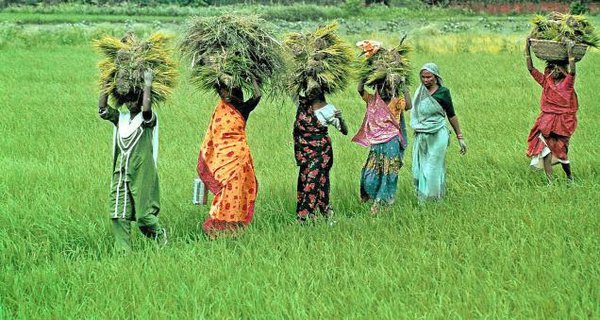
"Changes are on the way for women farmers"

Changes are on the way for women farmers. Some of those changes are those brought by giant global forces, like climate change, environmental degradation, or migration patterns that can either leave them alone heading their households, or alone in search of work.
Statement by Phumzile Mlambo-Ngcuka, Executive Director of UN Women, on International Rural Women's Day
Changes are on the way for women farmers. Some of those changes are those brought by giant global forces, like climate change, environmental degradation, or migration patterns that can either leave them alone heading their households, or alone in search of work. But other changes are coming about through a better recognition of women farmers as a force in themselves, whose productivity and economic potential should be fostered, and whose improved livelihoods bring benefits all round.
In developing countries, approximately 43 per cent of agricultural workers are women who, together with women smallholder farmers, are responsible for producing much of the food available, as well as the unpaid care work that sustains communities. Improvements in their ability to operate and grow their small businesses successfully have important benefits for the community.
Agents of change
Rural women farmers can be agents of change in transforming food production and consumption so that land and resources are used efficiently and sustainably. They need policies and investments that facilitate their active participation and decision-making and their access to land and climate-resilient agricultural methods.
In Rwanda, a new programme run by UN Women in partnership with World Food Programme, is helping women farmers use digital technology to forecast demand for their crops and create more secure and profitable supply chains. The weather forecasting information that the platform provides also allows farmers to make better decisions on crops and adapt to climate variability by adjusting the planting time and making better use of fertilizers.
Barriers remain
Barriers within current legislation remain in many countries still, and need to be specifically addressed. Discriminatory laws can for example restrict women's land ownership, or limit women's ability to take out loans with which to buy better seeds or fertilizers and increase their harvests. These laws need to be repealed, and policies put in place that enable women farmers to scale up their production sustainably.
Food and agricultural initiatives often disregard differences in the roles, labour burdens, assets and access to resources of rural men and women. But if women in rural areas had the same access to land, technology, financial services, education and markets as men, they could increase agricultural production and reduce the number of hungry people-and among those, the women and girls who often eat last.
Three-quarters of the extreme poor live in the rural areas that are most vulnerable to the intensifying stress on water and land use that comes with climate change. To make significant progress towards achieving the 2030 Agenda for Sustainable Development, countries must integrate climate change concerns in their food and agricultural development plans and invest in solutions that support gender equality. By strengthening the capacities and assets of smallholder farmers, both women and men, we can help guarantee global food security, while increasing social and climate resilience.
UN Women is the UN organization dedicated to gender equality and the empowerment of women. A global champion for women and girls, UN Women was established to accelerate progress on meeting their needs worldwide. For more information, visit www.unwomen.org. UN Women, 220 East 42nd Street, New York, NY 10017, New York. Tel: +1 646 781-4400. Fax: +1 646 781-4496.